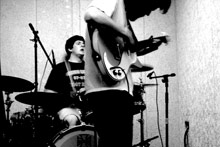The entrance to Apple Alley (a diminutive performance space located behind BookWorks in West Asheville) is a garage door. There among the hipsters and scenesters stands local duo King Tut, poised between the opposing forces of their own studio sound versus their live performance.

While King Tut’s MySpace page (www.myspace.com/kingtutband) hints at a band that in the studio relies more upon electronic beats and samples, the six available tracks show a group suspended between techy experimentation and warm washes of acoustic guitar. The space around the notes seems every bit as important as the vocal chants and samples that are woven into each song.
King Tut live is a different beast entirely. Built around the towering drumbeats of Drew Veres and the droning guitar of Mark Boyd, the band is less like the soundtrack to a marathon Saturday night and more like the echo-laden compunction of a Sunday morning hangover. Within the tiny walls of Apple Alley, the band’s cavernous din, copious reverb and string dissonance rattle around the room with the brains of the listeners.
Still, King Tut seems to make ambiguity work. Nestled in the nether region between the harsh fluorescent glow inside the club and the crisp autumn air outdoors, the beauty of what King Tut creates becomes apparent. Echoing off the metal doors and into the clear night, the band balances the drone of modern psychedelic music with the more humane vibe of indie rock.
Though King Tut is only a two-piece, together its players are more than the sum of their parts. The drumming and guitar strumming (a combo proven fruitful by the likes of The White Stripes, The Black Keys and The Trachtenburg Family Slideshow Players) combine with walls of repeating (and at times chaos-drenched) sounds. The effect is disorienting at first, but after a while it imparts a sense of drifting out to sea.
But instead of remaining pleasantly adrift, listeners are pummeled back to shore with every crash of Veres’ cymbals and shred of Boyd’s ax. In fact, Veres’ steady drumming is what keeps King Tut’s live show grounded. Boyd’s forays into guitar pyrotechnics may not scream Eddie Van Halen to purists, but the sharply played riffs and arpeggios help lead King Tut’s songs. This is, perhaps, most apparent on “When the Sun Goes Down,” the best example of the marriage between the sample-happy studio performers and their ear-destroying live act.
Within that song however, there’s a moment when the two personalities of King Tut come together. During a lull in the music, the guitar quiets down and the drums are but a whisper. It’s that precise moment when the audience falls in love with King Tut. Somewhere between the laptop rock and the dollar PBR psychedelia there’s magic happening in Apple Alley.



Before you comment
The comments section is here to provide a platform for civil dialogue on the issues we face together as a local community. Xpress is committed to offering this platform for all voices, but when the tone of the discussion gets nasty or strays off topic, we believe many people choose not to participate. Xpress editors are determined to moderate comments to ensure a constructive interchange is maintained. All comments judged not to be in keeping with the spirit of civil discourse will be removed and repeat violators will be banned. See here for our terms of service. Thank you for being part of this effort to promote respectful discussion.